Recent posts

Industry Experts
Common ASO Mistakes African App Developers Make
09 January 2026

Ace of Trades
The South African Industrial Tech Revolution
05 January 2026
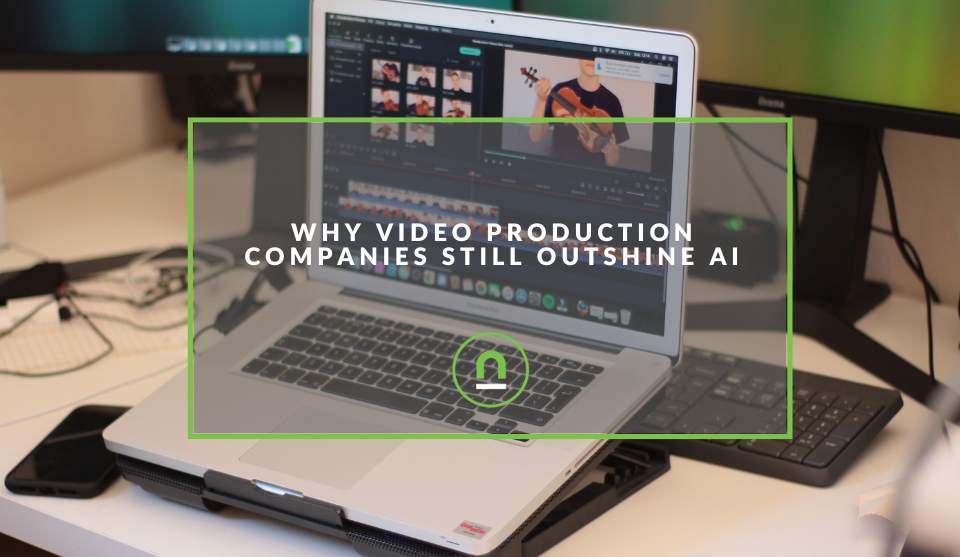
nichemarket Advice
Why Video Production Companies Still Outshine AI
24 December 2025

Press Releases
Where You Can Find International Remote Jobs For South Africans
23 December 2025
Popular posts
Extravaganza
Trending Music Hashtags To Get Your Posts Noticed
24 August 2018
Geek Chic
How To Fix iPhone/iPad Only Charging In Certain Positions
05 July 2020
Extravaganza
Trending Wedding Hashtags To Get Your Posts Noticed
18 September 2018
Money Talks
How To Find Coupons & Vouchers Online In South Africa
28 March 2019
Google SERPS Suffering From Overengineering
18 October 2022 | 0 comments | Posted by Che Kohler in nichemarket Advice
Google is the gateway to most of the world's internet experience; if you are going to browse the web, conduct research or want to fall down a particular rabbit hole, Google is often the place you would start. Google's page rank algorithm was legendary in the early 2000s and set the ground for building a trillion-dollar company and a network effect that seems almost unbreakable.
As Google's indexing grew, it provided better results, and consumers found it beneficial; businesses who wanted to get in front of consumers had two choices, pay Google or optimise their site according to Google guidelines. Creating this information marketplace, buyers and sellers continued to gobble up data and only seemed to aggregate faster each year. As this internet highway remains busy, Google can take plenty of liberties with its service.
Think of it like this, if every day you chose to take this private road on your way to work because it was the most convenient, you wouldn't care how many ads and billboards are placed in front of you along the way.
And that's what Google relies on, that most consumers won't question its changes, that Google is omnipotent and mistaking a network effect a high-quality service. Still, the truth is Google's offering has been in decline.
More clutter than content
If you performed a Google search a decade ago, you'd generally receive ten clear, organic, blue-link results with potentially a paid result or two; that was the formula, and it worked well. Google received a healthy stream of revenue, and consumers could easily discern between paid ads, and organic and could do proper research to find listings they prefer.
Now, check out a search result from today for "Bluetooth headphones."
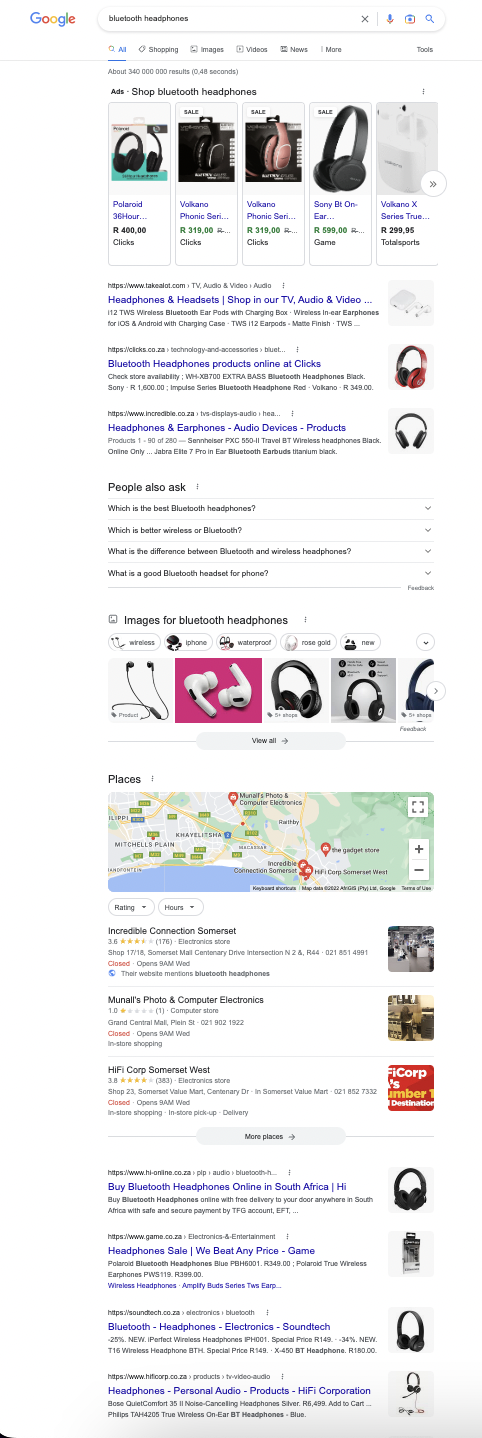
Google search for Bluetooth headphones
You can see the top results are Google Shopping ads, followed by text ads. What follows is a variety of sections, including search option bubbles, product reviews, and Google's "People Also Ask" feature, before we are finally given a single traditional organic result.
Today Google search results are made up of:
- Products Carousel - Merchant centre + Google Ads
- People Also Ask - Content marketing
- FAQs - Schema
- Local - Maps and NAPs
- Images - Image SEO
- Free Product Listings - Merchant centre
- YouTube and TikTok videos
- Knowledge graphs
While all of these sections can be useful, the problem is the clutter and complexity. It can be a visual chore to identify and understand each section and its significance to you and your search since Google is constantly changing and updating these on different search results pages.
Perhaps the biggest issue, however, is how rare it is even to see organic search results as you would with the plain old top ten. Discovering a natural result on Google these days requires you to be vigilant and send out a search party in your SERPs
In short, today's Google search results are cluttered, complex and lacking solid organic results with the primary intention of weaving ads and Google-owned products into the search experience and making them seem like preferred results.
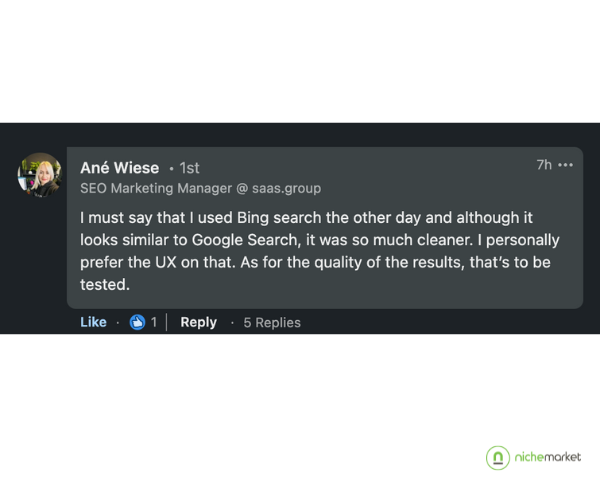
Source: Linkedin - SEO Ane Wiese's take on clutter in Google search
Google Ads are taking up more space
A study of over 10,000 different Google search results was tested to see how much real estate is attributed to paid listings and to see how far down the page organic search results landed.
In 2013, the average organic link began at 375 pixels down the page. When tested seven years later, in 2020, it dropped to 616 pixels. Clearly, it's getting more difficult to discover organic results, especially on mobile devices. If it takes an additional scroll or thumb movement to see an organic listing, it will get less of clicks; it's simply how Google works.
In the case of results where there was no ad, you'd think you'd be in luck and grab those coveted top spots. Sadly, Google has begun to push its own products into top spots, such as YouTube videos, Google Map results or even Google image search results. Still, Google also owns all these results and benefits when users click them.
This is unfortunate because organic Google search results are what made Google so valuable to consumers in the first place! We've seen these search results bring helpful outcomes to both users and businesses for years. The best website traffic that spends the most time on a website is almost always from organic search results, as they're a real, natural answer to a query.
Google used to focus on connecting the target audience with the organisation, and both benefit, all because of the purity of this organic link that was simply the best result for the user.
However, today Google is far more concerned with generating more impressions by encouraging time in search, sending users to Google products or encouraging multiple searches instead of scrolling down results.
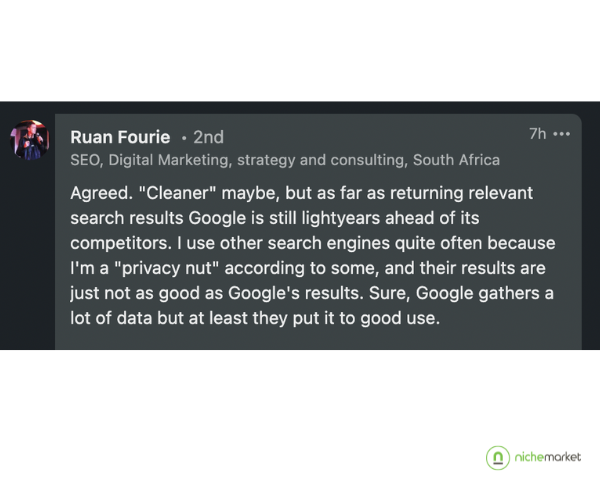
Source: LinkedIn - SEO Ruan Fourie on clutter in Google SERPS
The incentive to reduce organic relevancy
Google doesn't have an obligation to the user; you were going to use them anyway, so they can pretty much dictate your experience as they please and know very few people will jump ship. Google's obligation is to their shareholders and debt holders and reducing the discoverability of organic results it pushes traffic to paid listings and increases the number of clicks an ad receives.
The more users are pushed to paid, the heavier the competition for a single keyword, and Google can rake in larger margins on every bid. If you asked anyone at Google, they would glaze over the obvious financial incentives and argue its improves things, making life better for the user by providing more options.
But let's follow the money, shall we? The dirty little secret is that Google isn't particularly interested in sending anyone to your website or any other website. Generally, the more time someone spends on Google, the better it is for Google. If finding organic results is difficult, the user may be likely to click a search ad, and each clicked ad results in a payment to Google. Over 80% of the revenue of Alphabet (Google's parent company) comes from Google advertising.
I am not here to bash Google, I think all elements have their place, but I think there is an overengineering here with one goal in mind. To confuse users into thinking ads and google products are as good as organic listings.
There's certainly nothing wrong with Google including ads in its search results. It is a business that needs to turn a profit. Plus, the ads can lead to good results for the user in many cases. The issue is simply the overabundance and prominence of the ads and Google-owned products, making it harder for businesses to find consumers and vice versa.
Google can target individual listings.
A silly example would be the easter egg Google recently deployed on searches for the term "Velma" with a Velma gay-pride Easter egg in Google Search works on both mobile and desktop browsers.
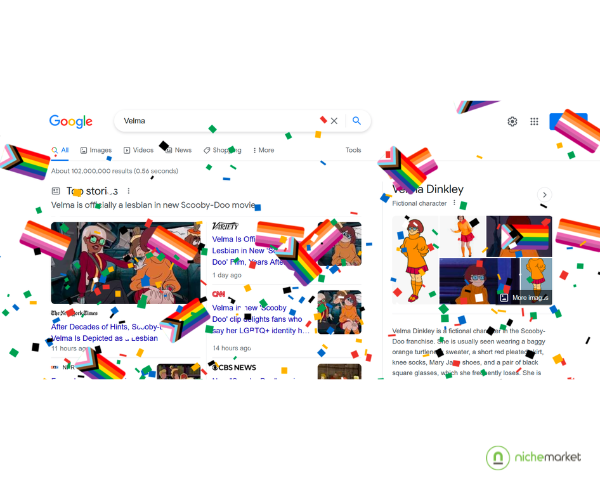
Google edits search listings for Velma
It's not the first time Google has hidden pop-culture Easter eggs in its search engine. Earlier this year, it launched a special Batman bat-signal animation timed for the release of "The Batman" movie and one for K-pop superstars BTS, which unleashes purple balloons you can pop with a click or tap to unlock audio messages from band members.
Now, if Google has the ability to go right ahead and edit the experience of certain search results for a campaign, do you honestly think that certain terms that can drive massive amounts of traffic are not being tweaked regularly to benefit certain parties?
Do you honestly think Google is some altruistic tech monopoly that would only use its powers to celebrate an upcoming movie? If so, boy, do I have a bridge to sell you.
Google's interventionist policies
Google has even openly informed us that it will begin to be the arbiter of truth for specific topics and will flag certain results. Google has long since moved from a data aggregator towards more of a publisher with its own editorial policy.
Instead of letting the market decide what information is useful and allowing consumers to make choices for themselves, Google has begun to step in to reduce the rise of certain trends, which are dictated by a central body.
Google is no longer allowing for a market solution and market engagement to resolve itself but to step in. When you have such power, it becomes intoxicating to use it. We've seen many a user, publication and even topics memory-holed due to political or financial incentives or influence.
Google doesn't provide optionality
What bugs me the most about the changes Google has made and the way it farms your data is there is no optionality for the customer; you simply have to accept any change they make and have no say in the matter. If you liked the old way Google did something, well, tough luck, we're doing it this way now.
Since customers can't opt into certain features of search it makes the way Google displays results even that much more frustrating. If we could choose the snippets or frequency or placement of where snippets would be, that would make Google a far better product and seems trivial to implement but adding a feature like that wouldn't do much for their income, so why bother?
Until it hits Google's balance sheet, you have no say in how Google goes about its business.
What can you do about it?
While we cannot do much to convince the general public to do something about Google's dominance, you can be the change you want to see in the world. While most people know very little about how the internet works and accept everything at face value, there are some actions you can take as an individual user.
If you're a consumer who is fed up with the way a product works, why do you feel the need to be held hostage? Especially when the product is digital in nature and switching costs are near zero.
Use an alternative search engine
I know, right? You're shocked, jumping ship from Google; who would have thought? But don't knock it until you try it; there are so many other search engines available today for you to test drive. So why not try setting up a different website as your starting or homepage in your browser and see if it makes any material difference to your internet experience?
- Bing
- Startpage
- Qwant
- DuckDuckGo
- Brave
- dSearch
- Yep
- Ecosia
- Yandex
- Petal Search
All these sites offer search indexing services, so give the competition a try and experience search without Google data mining your keystrokes to death.
Use a cleaned-up version of Google
If you simply cannot seem to break your ties with Google and feel their search results are not worth leaving the site, but the clutter is starting to get on your nerves, you do have the option of running a cleaner version of Google.
You can use Whoogle, which has many front-end sites offering localised search results, or you can self-host your own instance of Whoogle with a personal server. If running your own hosted search engine or finding Whoogle is too much of a pain, you can opt for a browser extension like the Simple Search plugin.
This plugin will overlay the top 10 text links for every search you make so you can choose to see only text results.
Let us help you with SEO and Google Ads.
Are you frustrated with the results you get from Google searches and ads? If you're looking to gain sustainable traffic to your website by boosting search marketing, feel free to reach out our team is here to offer guidance.
Please give us your take
So have you noticed a change in search results steering you to specific information? How are you dealing with it? Let us know in the comments down below.
Promote your business
Are you a business owner? Then why not register on nichemarket and put your business in front of thousands of nicheseekers every month. Registering with nichemarket is easy; all you will need to do is head over to our sign-up form and follow the instructions. If you require a more detailed guide on how to create your profile or your listing, then we highly recommend you check out the following articles.
Recommended reading
If you enjoyed this post and have a little extra time to dive deeper down the rabbit hole, why not check out the following posts on SEO and search updates.
- Google Launches Neural Matching Algorithm
- Is Pushing Live Too Many Pages Risky For SEO
- Why Ranking #1 Does Not Always Equal Improved Leads or Sales
- 10 Reasons Why Your Site Doesn't Rank For *Insert Keyword*
- Google Trial More Related Searches On Mobile
- Google Launches Expandable Featured Snippets
Tags: SEO, Search Engine Marketing , SEM
You might also like
The Rise Of Trading Platforms In South Africa
16 December 2025
Posted by Gabriela Pelayes in Money Talks
Discover how the rise of digital trading platforms in South Africa is reshaping commodity markets, boosting accessibility, efficiency, and the future...
Read moreBuilding Trust In Online Marketplaces Through Better Verification
17 December 2025
Posted by Jay Stone in Shopaholics
Learn how advanced verification methods build trust in online marketplaces, protect users from fraud, and ensure a secure, reliable digital trade env...
Read more{{comment.sUserName}}
{{comment.iDayLastEdit}} day ago
{{comment.iDayLastEdit}} days ago
 {{blogcategory.sCategoryName}}
{{blogcategory.sCategoryName}}


